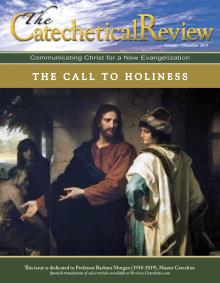During Advent of 2015, I was praying through the Prophet Isaiah when the Lord hit me over the head with these words, “Remember not the events of the past, the things of long ago consider not. See, I am doing something new! Now it springs forth, do you not perceive it?” (Is 43:18-19).
Eight years into ministry at that point, I was keenly aware of the challenges many of us face in catechesis today. Many of our students do not attend Mass or know Jesus in any meaningful way. Many parents have no confidence as their household’s primary catechist or no desire to fulfill the role they promised to fulfill when they presented their child for baptism. Many good-hearted volunteers either do not adequately understand the faith they are proposing, or they do not know how best to impart faith. In light of these challenges, the data around the hemorrhage of youth from the Church are not too surprising, though they remain heartbreaking.
What is a parish catechetical leader to do? The traditional remedies of buying new resources or adding new requirements to our programs seem to yield few results. As I pondered the Lord’s words through Isaiah, I heard him saying that the remedy, as usual, is metanoia, a change of heart. As the heart of the culture has shifted, the heart of the culture of catechesis needs to shift as well.
Culture Change
In an era when Catholic households rarely missed Mass on Sundays and rarely questioned Church teachings, the catechetical task was rather simple. We just needed to present clearly articulated and memorable statements of what the Church teaches to reinforce what was already being taught and lived at home. The culture of both the family and the country usually offered enough supports for the seeds of doctrine to yield the fruitful assent of faith. However, in an era of twenty percent Mass attendance and widespread relativism, doctrinal precision alone is not effective, as important as it may be. We have to build up to it.
We often forget that catechesis in general and initiatory catechesis in particular are movements within the larger process of evangelization, as spelled out in the National Directory for Catechesis. The necessary precursors of catechesis are pre-evangelization and the proposal of the kerygma. I often laugh when a catechist asks me how to get the kids to want to learn about Jesus. They will want to learn about Jesus when they want to, when it interests them, when they have responded to pre-evangelization with openness and to the kerygma with some level of initial conversion. Then, and only then, is catechesis appropriate or even possible.
We used to rely implicitly on the family, the culture, and the parish to provide the pre-evangelization necessary for catechesis. How can a faith formation program accomplish this? One solution can be found in a familiar program: Vacation Bible School.
The rest of this online article is available for current Guild members.
This article is from The Catechetical Review (Online Edition ISSN 2379-6324) and may be copied for catechetical purposes only. It may not be reprinted in another published work without the permission of The Catechetical Review by contacting [email protected]

















